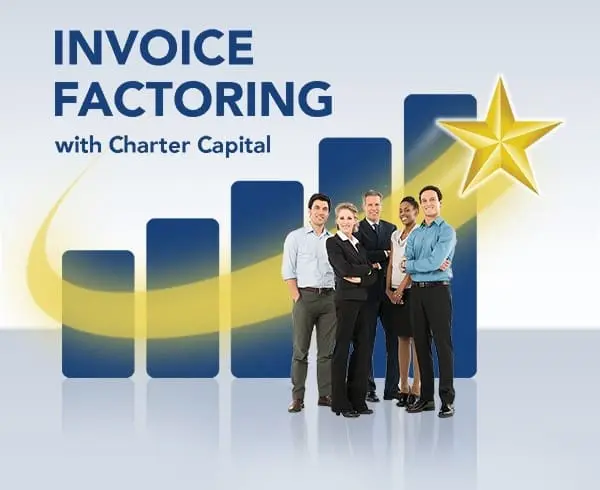Accounts receivable factoring companies offer financial services that provide funding to businesses for working capital purposes.
It is also known as invoice factoring, invoice discounting, or accounts receivable financing.
It is also a flexible and simple lending alternative for your company to obtain working capital.

Factoring Accounts Receivable Can Increase Cash Flow
Accounts Receivable Factoring is an excellent alternative to a traditional business loan. This speedy and easy process turns your accounts receivable into immediate cash for your company. Charter Capital has earned a reputation as an accounts receivable financing company for assisting small businesses when other providers cannot, and we are committed to providing the financial means for entrepreneurs to realize their full potential.
Charter Capital’s accounts receivable factoring has been a benefit to many companies across a variety of industries, including trucking, freight services, manufacturing, staffing, security, and oilfield services. You can outsource both your collections and credit checking processes with the additional benefit of instant cash flow. This gives small business owners more positive cash flow and allows them to focus their resources on other areas of their company. Invoice factoring can be a quick and cost-effective way to finance your company. Many B2B companies across multiple industries make use of invoice factoring services.
What is The Accounts Receivable Financing Approval Process?
Even if you have a poor credit score, you can still apply for accounts receivable financing. Upon determining if your customers are credit-worthy, the receivables factoring company will determine if your business qualifies for AR factoring. Because it is the credit history of your customers that is considered, it is important to note that if the risk of non-payment from your customers is too high, the application for financing may be denied. Accounts receivable financing is one of the more convenient small business financing options because it gives businesses access to cash flow while they wait for their invoices to be paid. If your application is approved, the invoice financing company pays out a percentage of the total value of your invoices, and once all of the customers have paid, the lender will pay the invoice balance that remains (minus a small factor fee).
What are the Costs of Invoice Factoring when Factoring Receivables?
Accounts receivable factoring is an affordable alternative to traditional bank loans. Invoice factoring companies calculate their factoring fees based on several factors:
- The industry you are in
- Your customer’s creditworthiness
- How long it takes for your customers to pay
- Average factoring costs fall between 1% and 5%, all depending on the factors mentioned above.
Average factoring costs fall between 1% and 5%, all depending on the factors mentioned above.
Accounts Receivable Factoring: A Versatile Cash Flow Solution
Accounts receivable factoring, a key financial transaction for businesses, involves a factor (factoring company) purchasing unpaid invoices to provide immediate cash for the company selling its accounts receivable. This type of receivable financing is particularly advantageous for companies needing quick access to working capital without the constraints of traditional bank loans.
When a business opts for accounts receivable factoring, the factor pays a percentage of the invoice value upfront, offering a lifeline in terms of cash flow. The relationship with a factoring company is built on trust and the understanding that the factor assumes credit risk and takes responsibility for collecting on the receivables. Different types of factoring, such as recourse and non-recourse factoring, present varying levels of risk and cost, with non-recourse factoring meaning the factoring company may accept the losses if the customer doesn’t pay.
The cost of factoring receivables often depends on the creditworthiness of your customers and the amount of receivables being factored. While factoring can be more expensive compared to other financing options, the immediate cash flow it provides and the relief from the responsibility of collecting on invoices make it an attractive solution. It’s important for business owners to weigh the advantages and disadvantages of factoring, considering factors like payment terms, advance rates, and the potential for bad debt.
In summary, accounts receivable factoring offers businesses a practical solution to improve cash flow and access cash quickly. It allows businesses to focus on growth and development without the worry of managing credit lines or high-interest rates associated with traditional loans. For those considering this financing option, understanding how factoring works, the associated costs, and the type of factoring suitable for your business is crucial in making an informed decision.

Benefits of Using Accounts Receivable Factoring Services
- Immediate increase in working capital – Accounts Receivable Factoring can help you release cash that your company holds in accounts receivable. This cash can be used for expenses like payroll and other business growth needs.
- Predictable cash flow – Eliminate the burden of waiting for payments from customers. Instead of waiting 30 to 90 days, or more, you can factor your invoices and get paid immediately.
- No new debt – Since this form of invoice financing is completely different than traditional bank financing and is not considered a loan, it does not appear on your books as debt. It appears on your balance sheet as more cash and fewer accounts receivable.
- Offer better credit terms – Offer your customers better payment terms without affecting your cash flow. When you are factoring accounts receivable, you receive funding directly to your bank account within 24 hours regardless of the terms you offer your customers.
- Go after big accounts – Offer credit terms demanded by large, slow-paying corporations without depleting your cash.
- Take advantage of supplier early-pay discounts – Most vendors offer discounts for early payment. With the predictable cash flow provided by receivables factoring, you can take advantage of early-pay discounts, improve your credit rating, and offset the cost of factoring, all at the same time.
- Spend more time building your business and less time managing your receivables – As experts in accounts receivable management and invoice financing, Charter Capital allows you to spend less time managing your receivables, and more time managing your business.
- Use of our complementary back-office support – As a business owner, you are continuously looking for ways to save costs. Reduce your overhead costs associated with managing your accounts receivable and processing payments. We will handle that for you.
Reasons Most Businesses Fail; They Run Out Of Cash
Accounts Receivable Factoring Services can provide your business with a much-needed cash injection to pay bills or suppliers. Often, there is a difficult gap between when an invoice is generated and when it is paid that can be filled by recourse factoring.
Many businesses use asset-based lending to boost growth. Businesses that have a good customer base but do not have the cash to support their growth are good candidates for invoice factoring. The great thing in this situation is that you are leveraging the unpaid invoices that you already have so you can get your cash earlier – with little risk and no new debt.
Finance Growth Without a Loan by Factoring Receivables

Small to mid-size businesses are continually faced with waiting 30 to 60 days or more to get paid on their invoices, which puts a strain on their cash flow.
Where large companies can usually afford to wait it out, small and mid-size businesses can’t. This can have a serious effect on management’s ability to pay the company bill or meet payroll. A cash flow shortfall can also affect the business’s ability to fulfill orders because the cash is tied up in unpaid invoices.
How can you get business cash without a traditional bank loan?
Accounts Receivable Factoring, allows businesses to capitalize on the power of their outstanding invoices. Factoring of accounts receivable is a valuable mechanism that turns your unpaid invoices into immediate cash, enabling you to fund your business operations. It is not very well known, but unpaid invoices as collateral from strong credit-worthy commercial clients are beneficial for factors. Most banks will not accept accounts receivable as collateral but accounts receivable factoring companies are more than willing to provide you with financing based on them. In most cases, a factoring company may provide funds when a commercial bank loan cannot.
Why use Account Receivable Factoring or Accounts Receivable Financing?
Many businesses do this to ensure a steady flow of upfront cash without having to sacrifice equity or take on debt. Businesses that use accounts receivable factoring firms are more concerned about having the most money now than later. Collecting an invoice takes time and effort. Companies that finance their accounts receivables get their money quicker and without the hassle of collecting.
In today’s struggling economy, freeing up working capital through factoring accounts receivable can prove to be vital. Access to immediate cash can be invested into new equipment, used to pay bills, or used toward payroll. Of course, the alternative is to chase the customer for the invoice payment and defer everything else while the money is tied up in the collection process. If you need help improving your cash flow, contact Charter Capital today for a free quote or to find out more about how our accounts receivable factoring services can benefit you.

